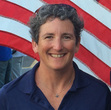Carol Newman Cronin's Blog, page 9
March 28, 2024
Keeping our Brains Tanked Up and Working Right
It’s been a minute since I wrote about dehydration, partly because—as I put it in a 2018 post called Supplementing Success—“I figure you come here to read about books and boats.” Also, habits that work well for me are no longer particularly newsworthy, after so many years of salt/rinse/repeat.
But even veterans still screw up occasionally, and our very first wingfoiling session in Antigua provided a fresh reminder of how quickly a few extra variables can throw body chemistry out of whack. The day before, Paul and I had breathed very dry plane air for several hours and then moved into a cottage with an unknown water supply. We were definitely enjoying the fifty-degree improvement in air temperature, but our bodies and brains needed extra fluid to help them adjust.
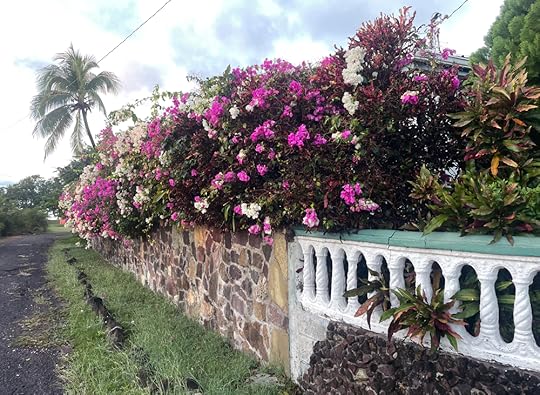
So when the breeze tempted us away from work that first afternoon, I found myself a bit light-headed just from pumping up my wing. Fortunately I had packed plenty of Endurolytes Extreme, so I quickly downed two and felt fine again—especially once I lost my balance and took an unexpected cooling dip just after pushing off the dock.
Paul usually does a fantastic job of keeping himself hydrated, so I didn’t think to suggest he also tank up on preventative electrolytes. But an hour later, when he finally made it back to shore (after an exhausting twenty minutes of paddling, because his wing had sprung a leak), something definitely wasn’t right. Instead of immediately pulling board and half-deflated wing out of the water, he just… sat there. “I feel like I’m gonna throw up,” he admitted, after a few tentative sips of Fizz-supplemented water.
I dug out two more Endurolytes Extreme and handed them over. He was already well past the more subtle “stupidity” phase, so my favorite “brain pills” didn’t bring him back to normal instantaneously. But by the time I’d packed up our gear, normal skin color had replaced that haunted “I’m about to puke” look. And when I drove us back to the cottage, he was alert enough to gasp at the nearness of scary Antigua road edges from the (left side) passenger seat. Less than a hour later, after tanking up on Fizz and HEED from the luxury of a shaded porch, Paul had reclaimed his normal sunny perspective. And for the rest of our time in Antigua, he kept us supplied with bottled water (even though in Antigua, it costs more than rum).
That first afternoon in the tropics was a great reminder that maintaining our bodies’ chemical balance is very personal. And, when we get behind, it’s critical to have the right recovery tools. So once again, thanks to Hammer Nutrition, this time for helping Paul recover quickly—and for making rehydration so easy.
You can learn much more about Hammer Nutrition on their website, and if you follow this link you’ll receive 15% off your first order. Thanks for reading, and I promise: next Thursday, I’ll be back to books and boats.
The post Keeping our Brains Tanked Up and Working Right appeared first on Carol Newman Cronin.
March 21, 2024
Book Review (and Musings): Tom Lake
Ann Patchett is very well known even outside the book-o-sphere as both an award-winning author and owner/proud champion of an independent bookstore. While I haven’t loved all of her novels, they are always thought-provoking and illuminating about our place in the world and how to live our best imperfect lives. Well-written, too, but that should be a given for anything I review here.
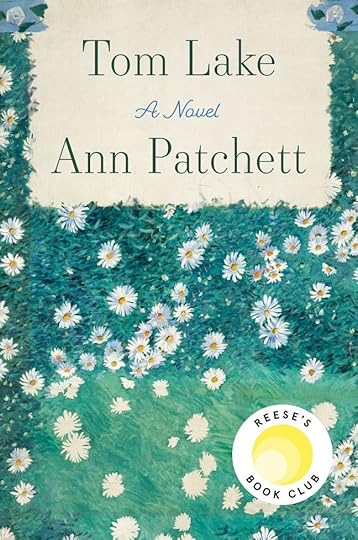
Also a given? No spoilers here, so read on.
The sole narrator of Patchett’s 2023 novel, Tom Lake, is a 57-year-old former actress named Lara Nelson; the story takes place during the first pandemic summer. Lara is secretly and selfishly joyful that a global crisis has brought her grown daughters back to live at the family farm, especially since they grew up picking cherries and can fill in for absent seasonal workers. As their father puts it to the middle child, Maisie (a budding vet), “College is closed. College can’t save you now.”
Snappy storytellingTo keep her three very different daughters entertained, Lara agrees to tell them about her own past. Interspersed with Lara’s carefully chosen words about her own teenaged and twenty-something years are her twenty-something daughters’ reactions to each segment, and both the dialogue and internal thoughts are almost always snappy—but never overwritten or unrealistic. ”I didn’t know it was going to be funny,” Maisie announces, at the beginning of chapter two. “No idea,” the youngest (Nell, an aspiring actor) agrees. Lara responds:
Not a name, a place
“It isn’t funny,” I tell them. “You know that. It isn’t a funny story except for the parts that are.”
“Life,” Nell says, dropping her head against my shoulder in a way that touches me. “Keep going.”
Before I started reading Tom Lake, I assumed the title was a character’s name. Turns out, it’s a location that is, metaphorically at least, the geographic centrum of the book. Though all of the “now” action takes place within the boundaries of the family farm, Lara Nelson clearly would have had a very different life if she’d never acted in the summer stock theatre at Tom Lake. It was there that she met her husband, as well as the now-famous movie star she “dated” that summer.
I put “dated” in quotes, because Lara herself muses about that term’s interpretation—aided by a mother’s careful filtering of facts. Early on, she explains to the reader that “the parts they’re waiting to hear are the parts I’m never going to tell them.” Later, she adds: “I am making one part of my life into a story for my daughters, and even though they are grown women and very forward-thinking, let’s just assume I leave out every mention of the bed.”
When I finished the book, I immediately went back to the beginning and read the whole thing again because the ending raised an annoying question: how had I already known a fact that was (I thought) only actually revealed on the final pages? Turns out, there were several breadcrumbs—including one that on the second read through, seemed to land far too early. But that tiny mistake only made me more impressed with the otherwise seamless story weaving; on any given page, I didn’t really care what year it actually was.
Our past is always presentI recommend Tom Lake for anyone who’s ever been amazed by how our past comes back to haunt us and the unique editorial choices of our own memories. There are also plenty of pithy observations about how we live now compared to a pre-Internet world, and how difficult it is to communicate that to a generation “so certain about the the things they do not know.” Here’s one micro example: “How did anyone survive without cellphones?” Maisie asks. “We survived very nicely,” her mother responds. Hard to believe, I know.
Got a book to recommend? Share it in the comments below, or send me an email. I read every single one, with gratitude—and don’t worry Larry, I haven’t forgotten about that “finding a best editor” post you requested!
The post Book Review (and Musings): Tom Lake appeared first on Carol Newman Cronin.
March 14, 2024
One Great Story Always Leads to Another
Pretty much every project (large or small) starts with a moment or three of doubt: is this really something worth pursuing? With hindsight, it’s easy to see that following my inspiration always leads to a creation of value—especially when I don’t worry about the final outcome.
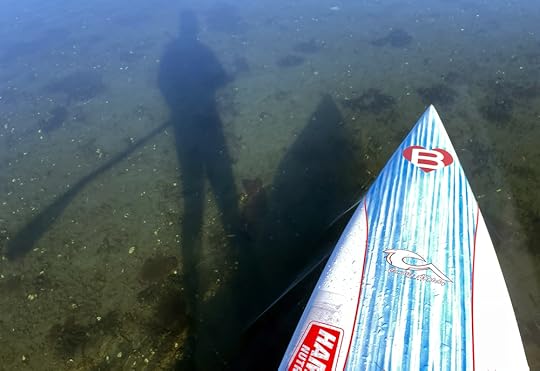 Sequels are the obvious example.
Sequels are the obvious example. Oliver’s Surprise inspired Cape Cod Surprise—and might have sparked even more stories about my favorite tween if not for the distractions of a real job.
My latest novel begins two years after Ferry to Cooperation Island. Neither book would exist if I hadn’t followed a random thought well beyond its natural conclusion: what would a curmudgeonly ferry captain do after losing his job?
A less obvious hindsight reveal:The research for my first non-fiction book definitely led me to the second—though at the time it wasn’t clear why I was so interested in a rather ancient photo of Aage Nielsen. A few months later, Seahorse asked for a short piece about a Nielsen design. That led to a very fun sail on Hound, which sparked my next non-fiction book idea! As one of my editor-friends likes to say, “There’s always another story.”
Which brings me to a resolution:Next time I begin a project (large or small), I’m going to ignore any doubts about the power of following my imagination—and instead be grateful for that luxury. Curiosity may have killed the cat, but it will continue to cobble together seemingly unrelated experiences into a crazy unmarked path that leads to what’s next.
Thanks for joining me. Got a thought about creativity? Share it in the comments below, or send me an email. Who knows, you just might spark another blog post—or even my next novel idea.
PS Apparently this is a common winter topic…
Rabbit Holes of Novel Research
Trusting Myself—and My Writing Process
The post One Great Story Always Leads to Another appeared first on Carol Newman Cronin.
March 7, 2024
Choosing a Late Night Adventure
My very favorite aspect of working for myself is that I mostly set my own priorities about what to do with my time. And once any must-dos are completed, I try to opt for what will bring the most joy.
But I also really love me a good night’s sleep. Which is why, a few weeks ago, I faced a difficult choice: should I get up in the very wee hours to go congratulate Hound on finishing the Caribbean 600, even though it would inevitably degrade my next day’s writing and wingfoiling? Or should I skip it, since my presence was actually not required?
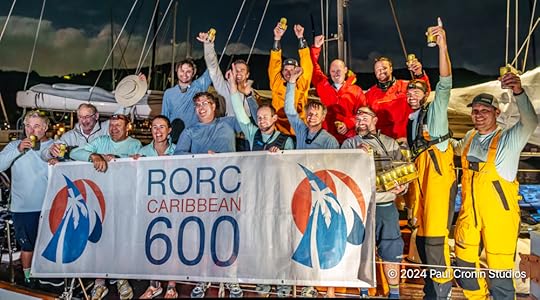 Hound’s crew enjoys their official Caribs after finishing the 2024 Caribbean 600
Hound’s crew enjoys their official Caribs after finishing the 2024 Caribbean 600When I woke up at 130am and checked the race tracker, it predicted a 2am finish—the perfect kick of adrenaline to get us out of bed and dressed. After driving across a dark island dodging tire-popping potholes, we rolled into the slumbering Catamaran Club just in time to spot Hound’s distinctive lights steaming across the harbor. Minutes later she was backing into the dock, moon illuminating those classic lines and gleaming varnish—as well as the smiles of a tired but satisfied crew.
We were soon joined by the official race greeters, who meet every finisher for a “banner photo” (and also swap a case of cold beer for the boat’s tracker). I haven’t seen any official pictures, but it was their photographer’s flash that enabled Paul (who didn’t have one) to successfully capture the moment.
On the drive home, he told me that “I didn’t know what to say.” But we didn’t need to say anything, because we had made the right choice: to be present for an occasion that we’ll reminisce about for many years to come. They say we only regret what we don’t do, and I’m very glad that I chose special occasion over slumber that night. As the cruise ship wife told her husband in a memorable Jimmy Buffett song, “Morris! You can sleep when you get home!”
The next day was indeed a bit fuzzy, but my adrenaline kept me going right through work, wingfoiling, and that evening’s prizegiving—when we got to cheer the boat’s second Caribbean 600 podium finish. Thanks to the Hound family for letting us share their joy, even if my photo of the prize giving wasn’t up to standard.
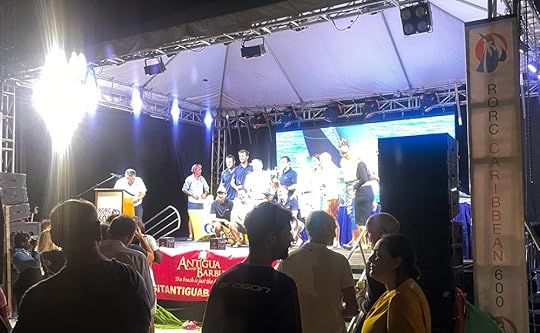 (Aren’t you glad there were official photographers to better capture this moment?)
(Aren’t you glad there were official photographers to better capture this moment?)Got a special moment when you made the right choice about where to be, or a regret about staying in bed? Share it in the comments below, or send me an email. And for more about choices and the many joys of self-employment, make sure to subscribe so you never miss a Thursday blog. Thanks!
The post Choosing a Late Night Adventure appeared first on Carol Newman Cronin.
February 29, 2024
The Luscious Luxury of Leap Day
Since I first started blogging in 2009, this is the very first time February 29th has ever fallen on a Thursday. So, with the stars aligning, I thought I’d share my thoughts about this quadrennial aberration.
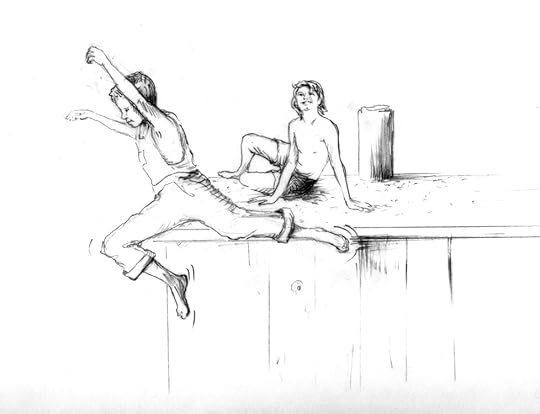 This Laurie Cronin drawing is one of my favorites from
Oliver’s Surprise
This Laurie Cronin drawing is one of my favorites from
Oliver’s Surprise
Turns out, a 2016 post Leaping on Leap Day already covers my evolving feelings about enduring not-so-fabulous February for an entire extra day, and I continue to wonder why it couldn’t be added to my favorite month of June instead. But now that weeks and months rush by far too fast, any chance to catch my breath before the calendar page turns once more is cause for celebration.
This year, I’m enjoying our extra day in the paradise they call Antigua. We don’t go back to Rhode Island until March—which, thanks to the way planets rotate, has been delayed by a whole day! Could we get any luckier?
How do you feel about Leap Day? Share your thoughts in the comments below, or send me an email. I read every single one—though this week I might not get back to you until after my afternoon wingfoiling session. Maybe I’ll even manage to leap into the water on this Leap Day 2024!
The post The Luscious Luxury of Leap Day appeared first on Carol Newman Cronin.
February 22, 2024
SailFaster Podcast: My Best Secret to Success
A few weeks ago, I enjoyed a chat with Pete Boland, an Annapolis-based sailor who’s producing a new podcast called SailFaster. I definitely fit the target demographic, “those who spend their waking lives (and probably their sleeping lives!) obsessing about how to sail faster than anyone else on the race course,” and I really enjoyed sharing a few nuggets of “wisdom” accumulated during a lifetime on the water that might help other aspiring racers.

My first podcast appearance was in 2018, when I chatted with Andy Rice about whether Olympic sailors are born or made. Since then, podcasting has exploded in popularity—and Andy Rice is now channeling his copious energy toward Road to Gold and high-speed Olympic commentary.
In 2020 I was invited onto the Around the Buoy podcast, where we discussed how the combination of books and boats has led to a very Interesting Life. Boatbuilder Carter Richardson and photographer Tyler Fields continue to put out about a podcast a month, and their topics are both wide-ranging and mouth-watering: from restoring ships like Coronet and Cutty Sark to sleep. I can’t wait to dig more deeply into what they’ve produced recently.
I’m also looking forward to many more gems about sailing faster from Pete Boland. Our wide-ranging conversation made me realize how much college sailing jump-started my competitive juices, and it also forced me to spell out my biggest secret to success: Find the best crew you can (for you) and keep her coming back for more.
There’s also an Olympic question I refused to answer… but you’ll have to listen in to learn why. Here’s the Apple podcast link, and there are other options on the Sailfaster website.
What I wrote six years ago about my very first podcast chat definitely still rings true: “Talking about sailing with another enthusiast remains one of my greatest pleasures.” I hope you enjoy the result as much as I enjoyed our conversation!
Got a favorite podcast about sailing and/or books? Share it in the comments below, or send me an email. I read every single one, with gratitude.
The post SailFaster Podcast: My Best Secret to Success appeared first on Carol Newman Cronin.
February 15, 2024
My February Joy: Logbooks at a New Latitude
As most of you know, I’m working on a history of the classic yacht Hound. This year, Paul and I used that as justification for an escape to Antigua, the boat’s long-time winter base. After all, it’s much easier to be the boat’s biggest groupie when living within walking distance!
A huge honorA few days ago, long-time captain Tom Stark loaned me his logbook. While officially serving as a legal record, the best logs read more like a journal; an emotional communication of a vessel’s importance to her humans. They are irreplaceable, so I was very flattered by his trust. “It’s only since 2019,” Tom said, adding apologetically, “and I did a better job early on than I do now.”

No apology needed: five years of cryptic but heartfelt notes brought back key details of both deliveries and day sails, while providing this groupie with several belly laughs along the way. “Beautiful day for a motor!” he wrote at one point. Along with dolphin and whale sightings, fish caught (and the meals they produced), he manages to convey the joy of Hound’s bluewater behavior: “Surfy and fun!” One of my favorite entries quoted a crewmember; “She sails like a happy puppy.” And of course there’s the relief of making landfall; arriving in Bermuda after his first offshore passage as captain, he wrote, “Dark and Stormies, babyyyy!”
Personal historySince 1970, my father has kept a log of Katrina’s many miles in soft-bound engineering notebooks. In his distinctive yet legible scrawl, he jotted down something almost every time the boat upped anchor or left the mooring. First was always crew names (family members abbreviated to a single letter, so I proudly became “C”); then weather and sailing details, harbors visited, and any unusual occurrences. More important to him (and far less interesting to me, until I took on the role of “little Skip”) was the meticulous logging of engine hours and mechanical details; documenting a switch to the second water tank helped us figure out when we would need to fill up again. Though Katrina hasn’t sailed nearly as many miles as Hound since their launchings in 1970, she has done two Transatlantics and several other offshore passages.
About ten years ago, Mom laboriously read into dictation software each handwritten entry, so that Dad could (after a lot of cleanup) share it as a PDF. The most recent update includes last summer’s Wingfoiling from a Sailboat, along with other adventures.
When we arrived here in Antigua, I opened up that PDF log to a bookmark labeled “Caribbean 1987” and refreshed my memories of this island. After a Transatlantic back from Europe, Mom and Dad and I had spent January working our way north from Grenada; once we arrived here, my parents flew home to work for a few months, leaving their 22 year old daughter in charge; a true leap of faith that I now find flattering as well as terrifying.
My own daily log entries brought me right back: the names of friends who joined me for a Caribbean winter escape; the underlying, never-ending, gut-worry of being the one in charge; fantastic snorkeling; boats that anchored too close; dinners in the cockpit; star-gazing. Our only connection to the world beyond Antigua was the single-sideband radio, so when I first heard that Dennis Conner had won back the America’s Cup, I added, “BBC’s dry edge was rather nice.”
Logs matter, at any latitudeWriting down daily occurrences may not seem at all significant at the time, but years later the details meld together into a very important primary history. Even if no one else reads my own scribblings, they serve as an excellent reminder about the timeless joys of this wonderful and friendly island.
In addition to enriching the story of Hound, Captain Tom’s notes have provided both excellent entertainment and a bit of perspective for the boat’s most devoted groupie. I’ll make sure to reward his trust by returning the logbook safe and sound, long before they leave the dock for next week’s Caribbean 600.
Got a story about a logbook (or journal) entry that changed your view of the world? Share it in the comments below, or send me an email. I read every single one, with gratitude.
The post My February Joy: Logbooks at a New Latitude appeared first on Carol Newman Cronin.
February 8, 2024
Book Review: The Marriage Portrait
My book group chose Maggie O’Farrell’s latest novel for our next meeting, and—just, wow. Even before I got to the first chapter, she had this reader asking two very key questions: is the main character crazy, and will she be killed or die on the next page or in the next section? Best of all, the author kept me wondering right up until the final pages—and I’m not going to reveal any answers here, so please read on.
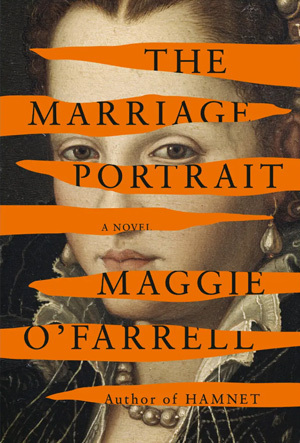
In that opening Historical Note, we learn that Lucrezia di Cosimo de’ Medici started her married life at age 15 and died less than a year later. “The official cause of her death was given as ‘putrid fever,’” it explains, “but it was rumoured that she had been murdered by her husband.”
Hmm.
When I turned the page, Chapter 1 (entitled A Wild and Lonely Place, dated 1561) shows us the world through this very young bride’s eyes:
Lucrezia is taking her seat at the long dining table, which is polished to a watery gleam and spread with dishes, inverted cups, a woven circlet of fir. Her husband is sitting down, not in his customary place at the opposite end but next to her, close enough that she could rest her head on his shoulder, should she wish; he is unfolding his napkin and straightening a knife and moving the candle towards them both when it comes to her with a particular clarity, as if some coloured glass has been put in front of her eyes, or perhaps removed from them, that he intends to kill her.
After a few paragraphs of grounding backstory, we move back into the scene:
Lucrezia’s fingers grip the rim of her plate. The certainty that he means her to die is like a presence beside her, as if a dark-feathered bird of prey has alighted on the arm of her chair.
I was completely entranced as a reader all the way through, but now that I’ve finished the book I’m even more impressed as a writer. The hardest way to tell a story is to let it drip and dribble out of carefully plucked details—and that’s exactly what O’Farrell has managed. She takes us into the mind of a duchess in Renaissance Italy and somehow brings that faraway world back to life.
Is she going to die? I kept wondering—which was tightly intertwined with: can I trust what Lucrezia—the only window into this strange world—sees and hears and feels? Is this conspiracy all in her head? And, most importantly, is her new husband a heartless villain or a respect-worthy statesman who loves her?
The novel jumps around in time, and especially in the final quarter of the book I couldn’t always follow whether we were in the “now” or the “then”—even though they were told in different tenses—or how much time had passed. It was, perhaps, a fringe benefit of the very deft and seamless writing, and in the end it simply didn’t matter exactly what day it was; each section advanced the story inevitably toward the answers I was seeking.
(All I will say about the ending is this: it was incredibly satisfying, and not nearly as dark as I expected.)
I usually try to hold off finishing a book until just our next meeting, but in this case I couldn’t stop reading until my questions were answered. This is the third book we’ve read by Maggie O’Farrell, and it’s by far my favorite to date. Born in Ireland and now living in Edinburgh, O’Farrell has woven together what could be a heavy tale without any heavy-handed telling; feeding us a steady and not-quite-enough drip of information through carefully selected detail and imagery. As a reader, I was entranced; as a writer, I was jealously impressed. I can’t wait to see where her muse takes her next.
Read previous book reviews and recommendations
The post Book Review: The Marriage Portrait appeared first on Carol Newman Cronin.
February 1, 2024
The 5 Simple Joys of Jigsaw Puzzles
This time of year, when winter and darkness force us toward inside entertainment, I take both comfort and challenge from a very un-competitive shoreside activity: assembling jigsaw puzzles. Here’s why I find moving small pieces of cardboard around a table so satisfying.
1. There’s a place for each piece; we just have to find itMuch about today’s world doesn’t seem to fit or make much sense. There’s comfort in knowing that focus and time will eventually turn a heap of chaos into the promised picture.
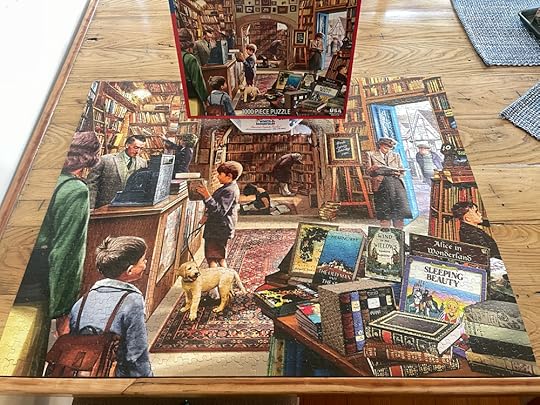 2. It forces me to differentiate between subtle details
2. It forces me to differentiate between subtle detailsWhen I first dump all the pieces out of the box, only the obvious colors stand out—so, once the edge is mostly complete, that’s where I start. But once that green coat, yellow lab puppy, and all those readable letters on the largest books are in place, I have to train my eye to pick out much more subtle differences. Ah—those more blurry book spines are shelved in the top left corner! And that swirl of plaid is too square to be part of the rug underfoot; it belongs to the owner’s suit jacket.
3. It provides a tactile rewardNo amount of creative computer time (including Wordle) can replace the physical satisfaction of snapping a piece into its proper place—especially when it’s a piece I’ve been specifically searching for.
4. I hear my MomEvery winter visit to my parents’ house used to include working on a jigsaw puzzle with my mother, and her patience and determination were legendary even as her strength waned. I frequently hear her voice in my head, trying to describe a color or placement—and my jigsaw “rules” all come from her; build the framework first, put together the obvious sections, and trust that time and patience and attention to detail will bring the rest into position, piece by piece.
5. Everything’s in the boxIn 2009, I told you that I do my best writing when “I focus on the little pieces, trusting that an overall shape and texture will eventually appear.” (Read more in What’s a Rough Draft?) In 2015, a change in my work routine inspired a post about how seemingly insigificant details really represent life choices. Unlike novels or life, I know before I begin that a jigsaw puzzle already includes all the pieces I really need—and nothing more.
Got a favorite off-season habit? Share it in the comments below, or send me an email. I read every single one, with gratitude.
The post The 5 Simple Joys of Jigsaw Puzzles appeared first on Carol Newman Cronin.
January 25, 2024
Author Spotlight: Henriette Lazaridis
A recent New Yorker cartoon made me chuckle: “Everyone wants to meet the author, but nobody wants to read the book.” The reverse can also be true: sometimes, you just want to read the damn book.
What’s extremely rare is to enjoy both the author and the writing they produce. For me, one of those wonders is Henriette Lazaridis. For one thing, she is the only other author I know who’s also a serious athlete: rower, skier, and most recently marathoner (she ran Athens!). So her posts intertwine recent race results with news about her next novel, which definitely makes me feel just a little less… odd.
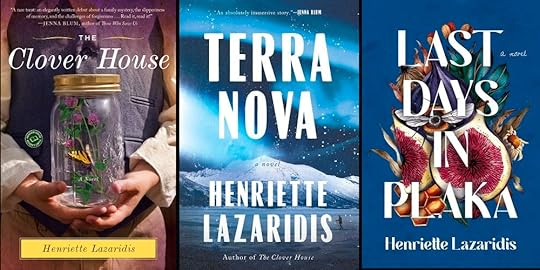
Her books also make me feel less odd, because they don’t come out on a regular schedule—and they cover a very wide range of geography and word counts. Her 2013 debut, The Clover House, switched between the perspectives of daughter and mother in two different timelines: 21st century Cambridge (Massachusetts), and Greece on the eve of World War II. I was so inspired, I signed up for a seminar she led that helped me figure out what she called “the book you are really trying to write.”
Henriette’s second novel came out in 2022. Terra Nova tells a fictionalized version of two men and their very real race to the South Pole in the early 1900s, enriched by the perspective of the woman photographer who loves them both. Last spring, I convinced Henriette to talk at our local independent bookstore, Curiosity & Co, and my book group also read Terra Nova. In short, I did everything I could to spend more time with both the woman and her writing.
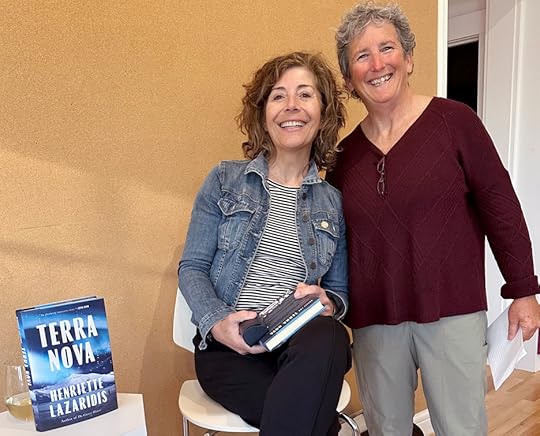
And in April 2024, a third and very different book comes out: Last Days in Plaka, set in present-day Athens. It’s hard to imagine any greater contrast, from the freezing cold of the Antarctic (I read Terra Nova under a blanket) to the dry heat of August in Greece (consume before the air gets too sultry, or you might have to install air conditioning). It’s quite a bit shorter, too.
I was lucky enough to read an advance copy, and I loved exploring a city I knew only during its pre-Olympic 2004 frenzy. I also enjoyed the unlikely friendship between a very old woman and a very young one, and the book’s opening; an intriguing sentence (“This is not her story.”) that instantly begs a question: which her? The second sentence answers, like a call and response with the reader: “She stole it from the young woman who did not realize until the end that it was hers.” Which begs a second question: If it’s not about the older woman, why start there?
After learning that she is a neighborhood fixture “not much inclined to shame,” we witness their first meeting:
“When the young woman stopped at the old woman’s apartment to deliver a basket of fresh figs from the priest’s family while he was still at weekday service, no one would have expected her to stay for conversation, especially not the young woman herself who had something else to do. But our story thief, our beauty—Irini is what we will call her—invited the young woman up for tea and encouraged her to eat two figs from the basket and poured a glass of lukewarm water for her to drink, and she did not send the young woman down the stairs into the square until the rooftop cinema across the way had begun its early show and bats were swooping through the mulberry trees.”
Like my own work, Henriette’s novels could be called “quiet.” Unlike my books, there is seldom a wasted word—and such a strong sense of location that you feel the heat (or cold) as you read. How do you do that? I asked, about Terra Nova. Henriette explained that she wrote the first draft longhand, huddled over an early-morning kitchen table in the depths of a Cambridge winter, so some of her own shivering worked its way onto the page. After finishing Last Days of Plaka, I asked how she wrote the dry heat of Athens in August that’s so draining, even most locals find a way to flee. “Honestly, this book came upon me without invitation,” she replied. “I think it grew from the combination of my missing Athens terribly during the pandemic combined with my greater awareness that time was/is running out for us all, as mortals. The days were so precious and the pandemic made me feel like we were wasting them. Those two things put together seem to have created the image of the woman and the basket of figs, and it just grew from there!”

Pre-orders are one of the best ways to support authors (learn why here), and through bookshop.org a portion of your purchase will also benefit the local bookstore of your choice. Meanwhile, I’m going to ask Henriette to include Curiosity & Co. in her next book tour—if only to bring a little more heat with her this time around. Because—unlike most of the novels I devour—I really do want to “meet” this particular author (again).
Got a favorite author, or one who proved a disappointment in person? Add a comment below or send me an email (even if it’s yours truly). I read all the thoughts you share, with gratitude.
For more info, visit Henriette’s website.
The post Author Spotlight: Henriette Lazaridis appeared first on Carol Newman Cronin.

